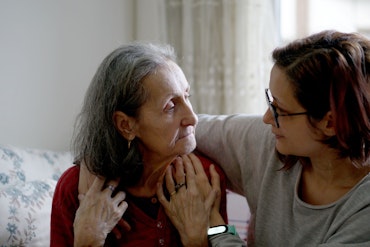Seniors putting ‘pressure’ on palliative care
An ageing population will increase demands on palliative care as more Australians develop cancer and chronic illnesses, says Palliative Care Australia chief executive, Liz Callaghan.
Ms Callaghan's statement came as the Intergenerational Report predicted there would be 40,000 people aged 100 years and over living in Australia in 2055.
“Unless there is a rapid change in our health fortunes a vast majority of those people will need palliative care at some stage in their lives,” she says.
“As in previous intergenerational reports, it calls for measures to sustain the future health and aged care systems. Central to that is access to palliative care – something we know improves patient outcomes, ensures patient and family satisfaction and can prolong life. Along with advance care planning, early access to palliative care can assist in reduction of spending on hospital based care.”
Ms Callaghan says the dying cannot be forgotten when planning health care provision.
“We estimate that in 2011 nearly 147,000 Australian’s died and about 70% of them would have benefitted from access to palliative care services. However, only 30% to 50% of them received services, leaving the rest to die without access to adequate symptom and pain management or psychosocial care.
“Australia already has an ageing palliative care workforce and the need for services will only grow. The Intergenerational Report predicts the number of people aged 65 years and over will more than double by 2055.”
According to Ms Callaghan, as Australians age, they will suffer higher rates of cancer and/or multiple chronic illnesses.
“Palliative care is essential in keeping these people living as well as they can throughout their illness and keeping them comfortable when they reach end of life.
“Aussies are not very good at talking about death and dying. We tend to shut the dying away and hope they don’t remind us too much of our own mortality. This needs to change,” she says.
Ms Callaghan describes the Intergenerational Report as a “wakeup call” to all Australians that there is going to be a great deal more death and dying in our future.
“We need to be prepared. We need to establish the palliative care services that will keep our terminally ill patients happy in their life and comfortable as they die. We need to ensure the palliative care workforce exists to care for the exponential growth in ageing and terminally ill Australians and we need to get comfortable with talking about, and preparing for death.”























